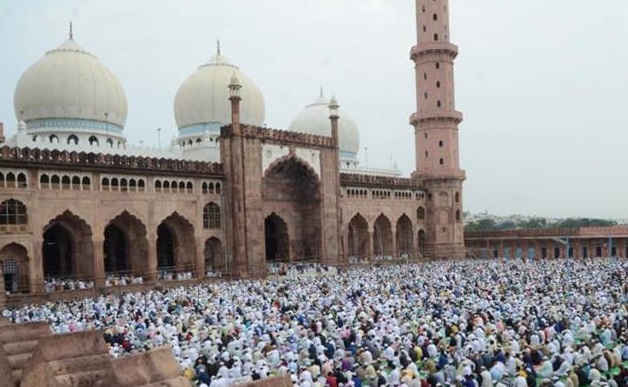Last Updated on April 26, 2024 12:06 am by INDIAN AWAAZ

Syed Ali Mujtaba
In the series of articles on the voting choices of Muslims in India, this is the 10th write-up and last that looks at the political scenario in Madhya Pradesh and Chhattisgarh. The idea of writing these pieces is to submit to the Muslim audience their voting options for the 2024 Lok Sabha election.
Madhya Pradesh, with 29 Lok Sabha seats is one of the most important states for the upcoming general elections. It is the sixth-largest state concerning the number of seats in the lower house.
Elections have long been held in Madhya Pradesh under the ‘two-party’ system, the BJP and the Congress. Here, two parties come to power in rotation as there is no other party to challenge the supremacy of the ‘big two.’
In the 2019 general elections, the BJP won 28 of the 29 LS seats and Congress just one. In the 2014 Lok Sabha election, the BJP won 27 seats and the Congress 2. Apart from that, the BJP also witnessed a big victory in the Assembly election, winning 163 seats in the 230-member, while Congress won 66 seats.
According to experts, 47 Assembly seats have Muslim voters ranging are 5,000 to 15,000. In 22 assembly segments, their number ranges from 15,000 to 35,000. Muslim voters are a deciding factor in three segments of Bhopal, two in Indore, Burhanpur, Jaora, and Jabalpur among others. However, the reality is that Muslim representation in the assembly is restricted to two seats Bhopal North and Bhopal Central. In the last Assembly election, Muslims won just two seats.
In the Lok Sabha poll, Muslims have a decisive role to play in the Indore-Ujjain division where there are 7 Lok Sabha Constituencies. Muslim also has votes in Jabalpur East and Patan seats as well. Ironically Muslims are given just a few tickets for the Assembly election but no ticket for the Lok Sabha election. This time also both the BJP and the Congress have not given any ticket to a Muslim candidate.
It is ironic, that no Muslim organization is interested in doing a field survey to know the ground reality of Muslim electoral strength in Madhya Pradesh. Muslims have taken Congress for granted to be their preferred choice. It is the Muslim vote bank politics of the Congress that has spiked the BJP to consolidate its Hindu vote bank.
In this rate race of religious polarization, the Congress is also running after the Hindu vote bank. Madhya Pradesh is a classic example of how the Muslim community is being politically marginalized in India. Congress by not giving tickets to the Muslim candidate has politically abandoned them.
Chhattisgarh: There are 11 Lok Sabha seats in Chhattisgarh. The Muslim population is a mere 2.02 percent in this tribal state. Muslims are mainly in the cities, towns, and in the urban settlements hardly in the rural areas. In the 2019 Lok Sabha election the BJP won 9 seats and Congress 2 seats respectively out of 11 Lok Sabha seats in Chhattisgarh.
The Muslims in Chhattisgarh stare at their diminishing representation in the legislative assembly and almost zero in the lower house of the Parliament. This is because both the Congress and the BJP have sidelined the Muslim community in the distribution of tickets. In the upcoming Lok Sabha elections there is no Muslim candidate.
In Chhattisgarh, since 2003, the Congress has fielded two Muslim candidates but in the last Assembly election, the Congress had fielded only one candidate who also lost. On the contrary, the BJP did not give the ticket to any Muslim candidate since 2003. As far as the voting pattern concerned, Muslims have a voting inclination is toward Congress. It is seen that in the OBC-dominated constituency, Muslims have made their presence felt and its example is the Raipur assembly constituency.
Conclusion – Electorally, Muslims are sleeping in India. Elections come and go without bringing any change to the Muslims. Instead of improvement, Muslims are becoming politically irrelevant in the country. No Muslim political organization has the gum and guttation to take up the cause of the community and make Muslims electorally relevant in India.
The need of the hour is to have Muslim regional parties that in combination with Dalits and other downtrodden segments of the society try to play with big two parties the game of electoral vote bank politics. This strategy alone is the future of Muslim politics in India.
Currently, Indian Muslims have all odds stacked against them. In the battle for survival, Muslim has no other option than to take electoral rebirth in India. The Hindu backlash is an obvious challenge but then the choice before Muslims is to choose a life of slavery or to play the electoral game of vote bank politics. After all, democracy is all about vote bank politics, the negative narrative is to mislead the proud community in India. Indian Muslims should learn to play the electoral game for victory and that alone can make the community relevant in Indian politics.
——
Syed Ali Mujtaba is a journalist based in Chennai.
